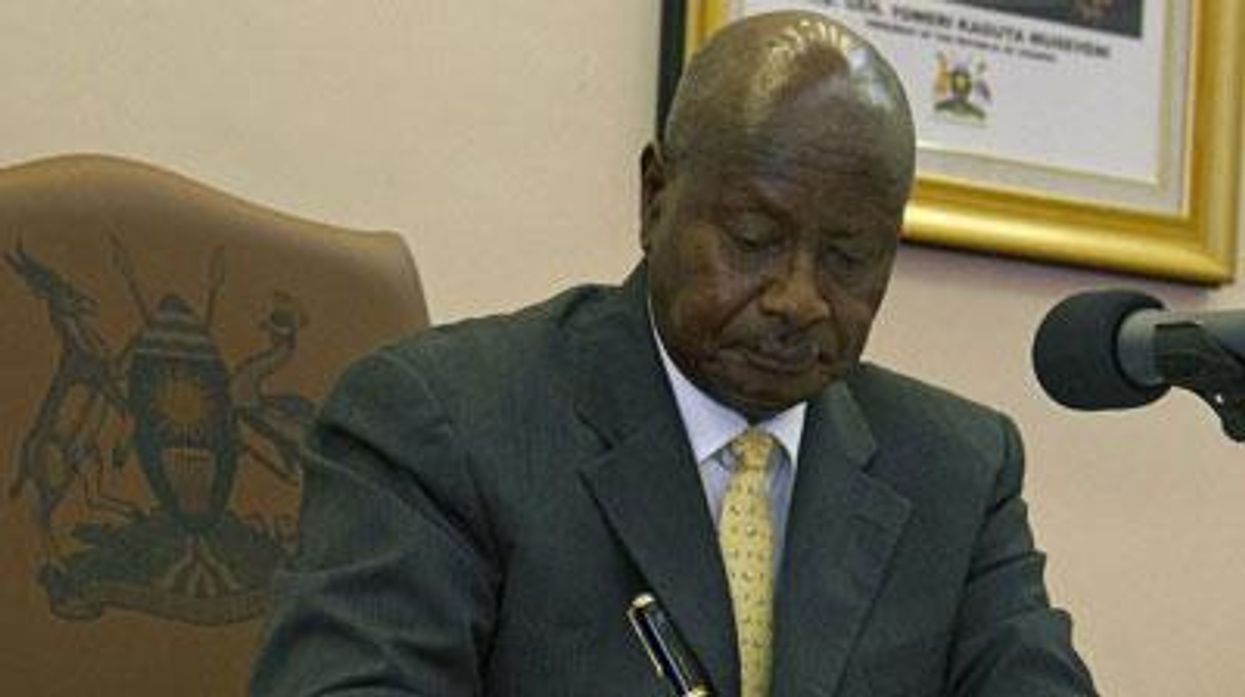Ugandan president Yoweri Museveni signed the long-pending Anti-Homosexuality Bill into law Monday, telling legislators he was convinced that homosexuality was a learned behavior, not an innate characteristic.
In response to Museveni's signature making certain instances of homosexuality punishable by life in prison in Uganda, U.S. Secretary of State John Kerry announced that the Obama administration is now reconsidering the terms of its close relationship with the Ugandan government, echoing the president's statement last week that the he was "deeply disappointed" by the law's then-imminent signing.
"This is a tragic day for Uganda and for all who care about the cause of human rights," Kerry said in a statement issued Monday. "Ultimately, the only answer is repeal of this law. ... Today's signing threatens a dangerous slide backward in Uganda's commitment to protecting the human rights of its people and a serious threat to the LGBT community in Uganda. ... Now that this law has been enacted, we are beginning an internal review of our relationship with the Government of Uganda to ensure that all dimensions of our engagement, including assistance programs, uphold our anti-discrimination policies and principles and reflect our values."
When Ugandan lawmakers first considered the Anti-Homosexuality Bill in 2009, the legislation called for the death penalty for anyone convicted of the felony of "aggravated homosexuality," which was defined as repeated same-sex sexual encounters between consenting adults, any sexual encounter in which one person was a minor or HIV-positive, or any in which the participants were under the influence of drugs or alcohol.
The law as passed Monday replaces the capital punishment provision for "aggravated homosexuality" with a stipulation mandating life imprisonment and orders that a person charged with the offense must undergo a medical examination -- which in practice is usually a forcible anal examination -- and HIV test, regardless of the individual's consent.
The law also imposes harsh sentences on those convicted of aiding, abetting, or conspiring to engage in homosexuality. Any person or organization performing a same-sex marriage is likely to lose their licensure and spend as many as seven years in jail. The legislation also includes a section that allows for extradition of Ugandan nationals who are accused of violating the law but may have fled to other countries.
The law also enumerates the numerous ways in which the "promotion of homosexuality" is forbidden, clamping down on individuals, organizations, and media outlets that discuss LGBT identities. Specifically, the law imposes five- to seven-year prison sentences on any individual or group that uses the Internet, film, or mobile phones "for the purposes of homosexuality or promoting homosexuality"; anyone who produces, markets, broadcasts, or disseminates "pornographic materials for purposes of promoting homosexuality"; anyone who "funds or sponsors homosexuality," "offers premises and... fixed or movable assets for purposes of homosexuality"; and anyone who "acts as an accomplice or attempts to promote or in any way abets homosexuality and related practices." If a corporate entity or nongovernmental organization is found guilty of promoting homosexuality, that group's formal registration with the nation will be canceled, and the director of said organization could be imprisoned for seven years.
When signing the bill Monday -- under substantial pressure from lawmakers in his own ruling party and religious leaders in the country -- President Museveni said he was swayed by the two-page, uncited "scientific" report prepared for him by a group of antigay lawmakers who claimed to have "medical backgrounds."
"After exhaustive studies, it has been found that homosexuality is in two categories," Museveni told members of Parliament gathered to see him sign the bill Monday, according to Uganda's Independent. "There are those who engage in homosexuality for mercenary reasons on account of the underdeveloped sectors of our economy that cause people to remain in poverty ... and then there are those that become homosexual by both nature (genetic) and nurture (upbringing). ... Can somebody be homosexual purely by nature without nurture? The answer is: 'No.' No study has shown that. Since nurture is the main cause of homosexuality, then society can do something about it to discourage the trends. That is why I have agreed to sign the Bill."
In a characteristically contradictory fashion, Museveni closed his remarks Monday by saying that as a leader and as a country, "We reject the notion that somebody can be homosexual by choice; that a man can choose to love a fellow man; that sexual orientation is a matter of choice."
"Since my original thesis that there may be people who are born homosexual has been disproved by science, then the homosexuals have lost the argument in Uganda," continued the president. "They should rehabilitate themselves and society should assist them to do so."
But LGBT activists in Uganda refused to be silenced. Kasha Jacqueline, a lesbian feminist activist and founding director of Freedom and Roam Uganda, one of the nation's oldest human rights and LGBT advocacy groups, defiantly tweeted a photo of herself Monday wearing a shirt reading "Sex Is Politics," adorned in rainbow colors:
In response to a Twitter user who suggested that she seek asylum in the United States, Jaqueline was resolute about staying in her country and continuing the fight for LGBT equality. "Thanks dear," she wrote Monday. "But I need to stay behind and join my other community that may not have the same opportunity. We need to be together more."
















